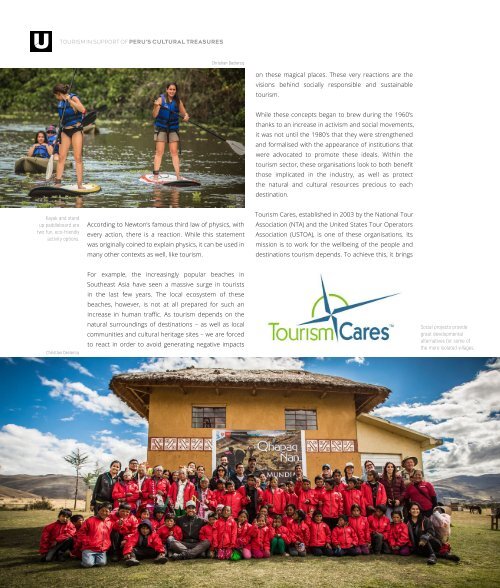UJ #19 - Sustainable Peru
You also want an ePaper? Increase the reach of your titles
YUMPU automatically turns print PDFs into web optimized ePapers that Google loves.
TOURISM IN SUPPORT OF PERU’S CULTURAL TREASURES<br />
Christian Declercq<br />
on these magical places. These very reactions are the<br />
visions behind socially responsible and sustainable<br />
tourism.<br />
While these concepts began to brew during the 1960’s<br />
thanks to an increase in activism and social movements,<br />
it was not until the 1980’s that they were strengthened<br />
and formalised with the appearance of institutions that<br />
were advocated to promote these ideals. Within the<br />
tourism sector, these organisations look to both benefit<br />
those implicated in the industry, as well as protect<br />
the natural and cultural resources precious to each<br />
destination.<br />
Kayak and stand<br />
up paddleboard are<br />
two fun, eco-friendly<br />
activity options.<br />
According to Newton’s famous third law of physics, with<br />
every action, there is a reaction. While this statement<br />
was originally coined to explain physics, it can be used in<br />
many other contexts as well, like tourism.<br />
Tourism Cares, established in 2003 by the National Tour<br />
Association (NTA) and the United States Tour Operators<br />
Association (USTOA), is one of these organisations. Its<br />
mission is to work for the wellbeing of the people and<br />
destinations tourism depends. To achieve this, it brings<br />
Christian Declercq<br />
For example, the increasingly popular beaches in<br />
Southeast Asia have seen a massive surge in tourists<br />
in the last few years. The local ecosystem of these<br />
beaches, however, is not at all prepared for such an<br />
increase in human traffic. As tourism depends on the<br />
natural surroundings of destinations – as well as local<br />
communities and cultural heritage sites – we are forced<br />
to react in order to avoid generating negative impacts<br />
Social projects provide<br />
great developmental<br />
alternatives for some of<br />
the more isolated villages.<br />
42

















